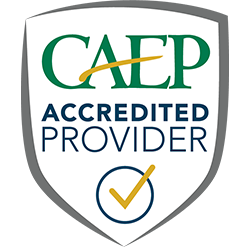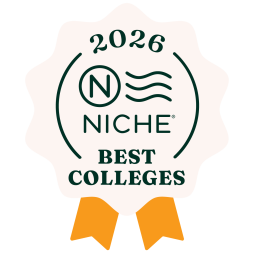
B.Ed. in Middle Education – Science
Inspire Students with an Understanding of Creation by Earning a B.Ed. in Middle Education – Science
Do you have a passion for science — ecosystems, weather patterns, anatomy, and understanding the universe from the molecular level to the vast expanse of space? If so, you’re probably excited about the idea of using your enthusiasm and knowledge to inspire the next generation of doctors, lab technicians, and scientists. Liberty University’s Bachelor of Education (B.Ed.) in Middle Education — Science degree can combine your love of the sciences with your desire to pass your wisdom on to others.
As someone who will be teaching adolescents, your preparation and understanding of their developmental stage is crucial. With this degree, you’ll gain core concepts in childhood and adolescent development, as well as specific teaching methods needed for middle grades. Upon graduation, you can be prepared to teach preteens general and science-specific concepts.
As you make your decision to partner with Liberty University, you’re deciding to gain skills, experience, expertise, and credentials to be a middle school teacher. We’re excited about partnering with you as you prepare to make a serious and positive impact on a new generation.
Upon successful completion of Liberty University’s Virginia state-approved Bachelor of Education program, you may apply for your teaching license in another state through reciprocity, which may or may not result in additional requirements based on your state’s Department of Education regulations.
Credit Hours
View CoursesNext start date: Aug 24, 2026

CAEP Accredited
Highlights
Highlights of Our B.Ed. in Middle Education – Science
Accreditation and Recognition
Liberty University’s School of Education meets rigorous national standards for educator preparation – standards set by the Council for the Accreditation of Educator Preparation (CAEP). This accreditation reflects our commitment to excellence and helps your degree to be respected by schools and employers.
Licensure and Financial Aid Opportunities
Pursuing one of our Bachelor of Education licensure-tracks may make you eligible for the Federal TEACH Grant – a valuable resource for future educators. Upon graduation, you can earn teaching licensure credentials that qualify you to begin your career in the classroom.
Real-World Teaching Experience
Complete 90 practicum hours and at least 1 full semester of student teaching before you graduate. You can gain firsthand experience by observing and teaching in a variety of school settings – helping to prepare you for the challenges and rewards of leading your own classroom.
Supportive, Expert Faculty
Study under professors who are not only experts in the field of education – they’re also passionate mentors. Each one is committed to your success and to Liberty’s mission of Training Champions for Christ through a faith-integrated approach to teaching.
Career Potential
What Can You Do with This B.Ed. in Middle Education – Science?
Upon successful completion of the B.Ed. in Middle Education, you can be prepared with a well-respected degree in education and endorsement for Virginia licensure as well as 90 practicum hours and at least 1 full semester of student teaching. This degree can help equip you with resources, tools, and knowledge to prepare for roles as a middle school teacher.
Liberty University’s B.Ed. in Middle Education can help prepare you to pursue the following occupations:
- Homeschool teacher
- K-12 curriculum coordinator
- Licensed middle education teacher
- Private school teacher
- Tutor


#2 Best College Campus in America
At Liberty, you’ll find an affordable, high-quality education designed to help equip students like you for the real world. Our commitment to excellence has earned us recognition as the #2 Best College Campus in America by Niche.com for 2026.
Earning your degree from a nonprofit university with state-of-the-art resources like ours can help set you apart from your peers.
Courses
What Will You Study in This Bachelor’s Degree in Middle Education – Science?
The bachelor’s degree in middle education can help prepare you with a variety of foundational courses in English, communication, math, history, physics, psychology, biology, and more, so you can feel ready to communicate these ideas and topics to your students.
Additionally, you’ll study a variety of courses that focus on how to educate children and adolescents. Some of your courses will include topics like classroom teaching, instructional design for middle classrooms, how to teach reading, writing, and language to diverse learners, and behavioral and individual differences between students.
Plus, you’ll complete 90 practicum hours and at least 1 full semester of student teaching prior to graduation.
By concentrating in science, you can gain additional insights with courses on the elements of general chemistry, environmental science, and astronomy. With these classes, you can gain a broad foundation in the types of science-related subjects you’ll be teaching your middle school students.
Additional Degree Information
Featured B.Ed. in Middle Education – Science Courses
EDUC 360 – Foundations of Education
EDUC 412 – Middle School Curriculum and Instruction
Degree Information
- This program falls under the School of Education
- View the Degree Completion Plan
- Check out our course catalog
- Transfer in up to 75% of the degree total
BENEFITS
Why Choose Liberty for Your Bachelor of Education in Middle Education – Science?
A Christ-Centered Commitment to Excellence
At Liberty University, our mission of Training Champions for Christ shapes every part of your experience. We are dedicated to providing a high-quality education that reflects our core values – integrity, excellence, and faith. You can rest assured knowing your degree program is designed with purpose and held to the highest academic standards, all while being rooted in a biblical worldview.
Faculty Who Lead by Example
Each education course is taught by experienced professors who have spent years in real classroom settings. These educators bring practical insights to their teaching – offering more than just theory. They are deeply invested in your growth, both academically and spiritually, and are committed to preparing you to make a meaningful impact in your future classroom.
Accredited and Respected
Liberty University is accredited by the Southern Association of Colleges and Schools Commission on Colleges (SACSCOC), and our School of Education meets the rigorous standards set by the Council for the Accreditation of Educator Preparation (CAEP). These accreditations demonstrate our commitment to quality – and help your degree to be respected and valued by schools and employers nationwide.
Pathway to Licensure and Classroom Readiness
Our Bachelor of Education (B.Ed.) programs are approved by the Virginia Department of Education (VDOE) – meaning you can graduate with licensure credentials that allow you to teach in Virginia. With a curriculum focused on both foundational knowledge and real-world application, we want you to be equipped with tools and confidence as a professional educator.
Admissions
How Do You Become a B.Ed. in Middle Education – Science Student?
Every application is reviewed by the admission committee on a case-by-case basis, meaning there are no set minimums for acceptance. However, all applicants must submit the following documents* for admission:
- Admission application
- Official high school transcripts
- Official college transcripts (if applicable)
- Admission essay
Results from the CLT, SAT, or ACT are not required for admission, but may be used in consideration for merit-based aid.
*Note that additional documentation may be requested by the admission committee after your application has been received.

Have Questions?
We’ll make sure you have the information you need to take your next step.